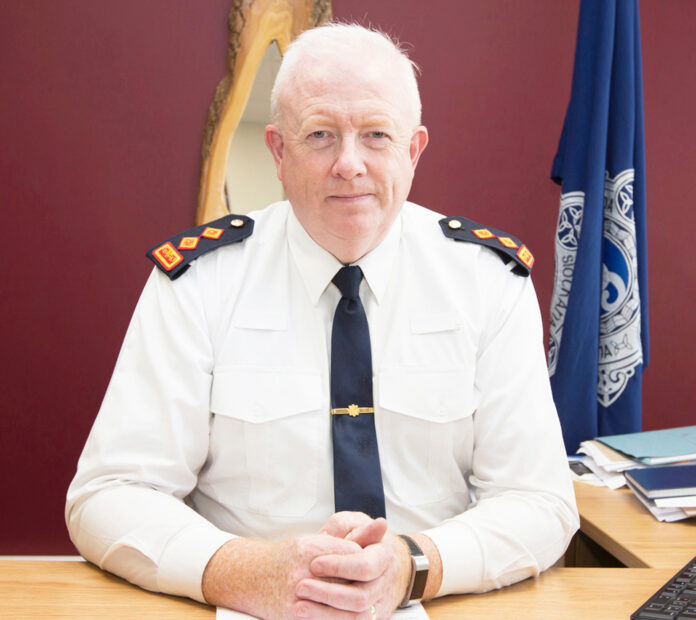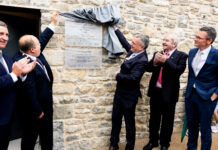
David Raleigh interviews Chief Superintendent Gerry Roche who has been in charge of the Limerick Garda Division for the past 15 months.
AS the man in charge of the Limerick Garda Division, Gerry Roche’s direct message to the citizens of the Treaty City is a simple one: “We can only do this together.”
Fighting crime has always been a serious and important a job, and Chief Superintendent Roche believes the man and woman on the street are a vital weapon the Garda crime fighting arsenal.
The east Galway native knows the value of working closely with the community and the information they share with the guards, which he agrees can help bring investigations over the line.
“No problem can be taken on by Gardaí alone. It has to involve agencies and communities all working together to make Limerick a peaceful, safe place,” he says.
Since his deployment to Limerick 15 months ago, he has had responsibility for all Garda operations across the city and county with 615 Gardaí and 65 civilian staff under his command.
His predecessor, David Sheahan, oversaw a massive shift in the public perception of Limerick – from gangland to granny – the latter being a giant French puppet that was one of the highlights of the 2014 City of Culture programme that attracted thousands of visitors and earned widespread acclaim.
Building on all this hard work, Gerry Roche has sanctioned “covert” Garda operations to maintain a huge reduction in shooting incidents in the city. In 2007 and 2008 there were more than 100 shooting incidents.
Last year there were three and the last gangland murder was in 2010.
Even though the number of shootings has diminished, drug dealers are still making vast amount of money.
A seasoned crime fighter, Gerry Roche earned his stripes having spent years on the front line tackling organised criminals, including some high profile names.
After graduating from the Garda training college in 1985, he was dispatched to Dublin’s “W District” and was involved in arresting Martin ‘The General’ Cahill a number of times.
Having “spent 12 years in the capital, he was sent to Galway in 1996, and spent most of career in the detective branch, leading the Galway Divisional Drugs Unit. A stint in Sligo followed and then onto Kildare, before he arrived in Limerick in February 2018.
He has been impressed with the strides against gang crime, which were mainly achieved through increased resources.
“That struck me when I came here. The set up that’s here; the structures; the amount of people we have, what they are doing, how we investigate crime; our incident rooms.”
“The experience I’m able to draw on here is huge. Anything can happen here and I know I have a team that can manage it, because they have basically dealt with it all”.
He praises the Fitzgerald Report which in 2007 called for 100 extra Gardaí to be deployed to the city to curb the bloodletting.
Had the government not followed the report’s key recommendation on Garda resources, he believes that the political classes “could have lost the city with regards to the way the violence was going”.
Another key part of tackling the scourge of drugs and gangland crime was providing education opportunities for people on the margins of society.
“Most problems are in socially deprived areas. You go to Dublin now and where’s the problem? It’s in socially deprived areas.”
He agrees it’s not hard for people who are born into “a lack of opportunity” to slip into a life of crime.
“They say opportunity knocks – but what if it never knocks, and the only time it knocks is when somebody is dealing drugs. That’s where education has come in, and that’s where regeneration has helped fix our poor quality housing.
“Look at the schools. You go to Moyross and you see that the kids there are fantastic, the teachers are fantastic.”
He agrees Limerick has seen the consequences of failing to invest in communities, but believes that since changes have come, “Limerick has been very lucky”.
“Limerick has had tremendous public representation in the Dáil. Politicians like Michael Noonan who helped get investment here. For the size of the place – a population of only about 191,000, and comparatively speaking that’s fairly small – but the size of the investment that has gone into Regeneration here has been incredible.”
He reiterates the importance of Gardaí having close ties with ordinary citizens: “I think the day of the Gardaí taking on any one problem on their own is gone – I really do. Probation services, health boards, councils, CCTV, courts, education and schools are all coming together in Limerick.”
“We are just at the beginning of that, and it will be a while before we have that it fully developed.
“What doesn’t go on in other places is there is a huge tie-up between ourselves and other agencies such as City Hall, the Council, the HSE, Regeneration who are all working hand in hand. It’s a unique relationship.”
“Regeneration couldn’t work without the other agencies. It’s great to see and I haven’t seen it happen anywhere else; it works very well.”
He has also been impressed too with the huge investment in the city, much of it from the European Investment Bank.
“You can see it all around the city and most recently with the Gardens International development.”
“Henry Street Garda Station is also in good nick. We’ve a whole new custody area here that we spent a million euro on that last year.”
“It’s great. I was in some bad stations in my time. They were nearly cupboards,” he jokes.
Gerry Roche’s vision for Limerick is to continue to “make this a safe place to work and live; for people to invest in, and feel safe in.
“How we do that is to investigate serious crime that’s very much a priority here but we also must continue to invest in communities in terms of community policing and interaction with the public.”










